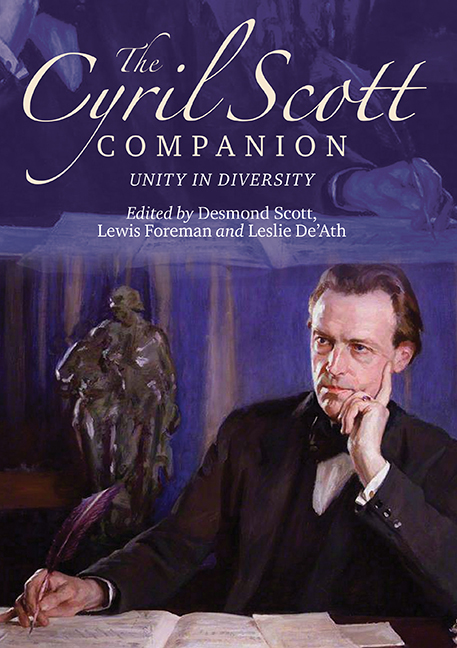Book contents
- Frontmatter
- Dedication
- Contents
- List of Illustrations
- List of Tables
- List of Contributors
- Foreword
- Preface
- Acknowledgements
- Editors' Note
- I SCOTT IN CONTEXT
- II THE MUSIC
- 8 Discovering, Editing and Recording Cyril Scott
- 9 ‘Years of Indiscretion’: The Early Piano Works, 1898–1909
- 10 ‘Like a Bird Sings’: The Piano Works from the Op. 66 Sonata to World War 1
- 11 The Later Piano Works
- 12 The Twenty-First-Century Orchestral Recordings: The Shock of the Unknown
- 13 The Chamber Music
- 14 Operas and Music for the Theatre
- 15 The Choral Works
- 16 The Songs
- III THE WRITINGS
- IV PERSONAL REMINISCENCES
- APPENDICES
- CATALOGUES, DISCOGRAPHY AND BIBLIOGRAPHY
- Index of Works
- General Index
11 - The Later Piano Works
from II - THE MUSIC
Published online by Cambridge University Press: 14 September 2019
- Frontmatter
- Dedication
- Contents
- List of Illustrations
- List of Tables
- List of Contributors
- Foreword
- Preface
- Acknowledgements
- Editors' Note
- I SCOTT IN CONTEXT
- II THE MUSIC
- 8 Discovering, Editing and Recording Cyril Scott
- 9 ‘Years of Indiscretion’: The Early Piano Works, 1898–1909
- 10 ‘Like a Bird Sings’: The Piano Works from the Op. 66 Sonata to World War 1
- 11 The Later Piano Works
- 12 The Twenty-First-Century Orchestral Recordings: The Shock of the Unknown
- 13 The Chamber Music
- 14 Operas and Music for the Theatre
- 15 The Choral Works
- 16 The Songs
- III THE WRITINGS
- IV PERSONAL REMINISCENCES
- APPENDICES
- CATALOGUES, DISCOGRAPHY AND BIBLIOGRAPHY
- Index of Works
- General Index
Summary
THE Great War fundamentally redefined every aspect of society, seemingly shattering all recollection of what had been important and fashionable in life before. No one was exempt. Those engaged in less utilitarian disciplines, such as the arts, found that the status quo had been swept away and many long-established conceits consigned to the past. Conceived in a more innocent era, they were no longer tolerable in a world that had seen such horror, devastation and disillusion. Scott was by no means the only composer to have lost the momentum, in the sense of public awareness and enthusiasm, that he had enjoyed before 1914. The musical bad-boy iconoclast of the Edwardian era was now increasingly perceived as a quaint relic of a former zeitgeist.
The Scott piano miniatures and songs continued to appear in about the same quantity, but this production is notable for the absence of any ‘signature’ works that were to maintain Scott's image during the rest of his life and into posterity. In this regard one is reminded perhaps of other composers who made their fame before 1914 and lived to see the end of World War 2, such composers as Richard Strauss and Florent Schmitt.
The British musical mainstream found Scott's works after 1918 – on the rare occasions when they found them at all – to be mannered, stylistically forced, arbitrary, abstract, gratuitously pseudo-modernistic, or just incomprehensible. Now in his forties and fifties, Scott continued to pen a steady stream of major works, mainly chamber, concertante and orchestral, that remained unpublished and were premiered, if at all, in regional locations on the fringe of general acceptance and publicity. There was an increasing sense in the musical mainstream that he was a composer to avoid, and by the outbreak of the 1939 war, at age sixty, his life was at a critical crossroad, both professionally and personally. He continued to compose prolifically during the interwar years, but then produced virtually nothing from 1937 to 1946.
Scott was attracted to the stage, in its various manifestations, throughout his life. He committed fourteen times to the business of writing music for the stage, from opera and ballet to incidental music and musical plays, and in addition authored a dozen straight plays in the 1940s. But his success in the field was limited. Apart from his opera, The Alchemist, few made it past the manuscript page.
- Type
- Chapter
- Information
- The Cyril Scott CompanionUnity in Diversity, pp. 161 - 176Publisher: Boydell & BrewerPrint publication year: 2018



